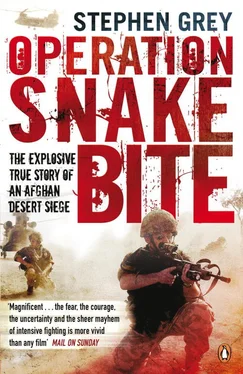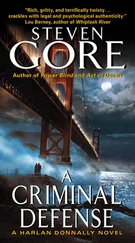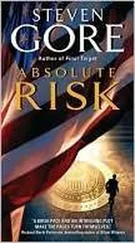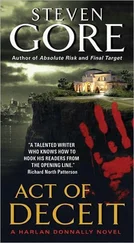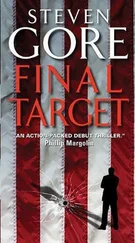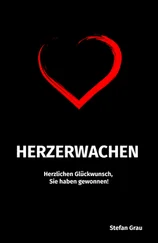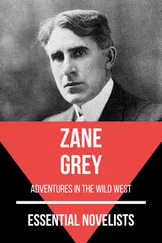So far, apart from pre-emptive strikes from the air, 1 Fury had not been in contact with the enemy. Nor did they know where the enemy was.
* * *
The Battle of Musa Qala wadi began shortly after dawn with a single round from an AK-47. Captain Adam Wehrle, the acting commander of 1 Fury’s Charlie Company, thought at first it was a negligent discharge by one of his soldiers. Then came incoming RPGs and automatic fire.
The Taliban were firing from all around Charlie, trying as much as the Americans were to find out exactly where their enemy had appeared from. They were scattered in positions throughout the tree lines, mostly for now on the same western side of the wide dry riverbed as the American paratroopers. They were making use of a deep irrigation ditch that ran in parallel to the riverbank, allowing them to run northwards and southwards as fast as they wanted.
Wehrle called for help from the battalion’s mortar line. Jet planes were soon on station and dived past in a show of force. And a bomb was dropped on a position about 75 yards away.
On the Musa Qala side of the river, about 4 miles further north, Bravo Company came under attack shortly after Charlie’s battle began. At 06.15, Specialist Brad Malone was on the roof of a little mosque setting up his machine gun when he shouted down, ‘Hey, I think I see someone with shovels or RPGs. I can’t tell.’
A moment later, he knew for sure. Two RPGs darted in, and a day-long fight began.
Malone was in cover behind two small domes on the roof. But he wasn’t protected from behind. The fire was coming from all sides. A bullet went through his Camelback water pouch. Seeing the attackers had crept within yards, Malone pulled out the pin from a grenade and was still holding it as he leaped off the roof, twisting his ankle. He managed not to let go.
Most of his 1st Platoon and the company headquarters were still below, trying to dry themselves off. After eight hours of walking and then crossing through the river and mud, most of the men were drenched.
If they had not arrived so late, Captain Don Canterna, the twenty-eight-year-old commander of Bravo Company, had planned to stretch his forces in a line across the green zone – from the riverbed on the western side to a road on the east. His three platoons would then have leapfrogged south towards Musa Qala centre. Instead, his 2nd Platoon had barely made it across the riverbed and was more than half a mile behind his 3rd Platoon and 1st Platoon. The latter was now in the centre of the green zone and vulnerable to attack from the north, east and south. With his line of attack incomplete, Canterna would at first not be mounting the sweep through the green zone he had planned but rather a hasty perimeter defence.
1st Platoon and Captain Canterna’s headquarters had stopped to rest in a mosque and a private home. A small alleyway ran between the two buildings, protected only by a low wall on the eastern side and a tree-flanked canal to the west.
After the attack began, Staff Sergeant Otilio Vasquez and his gunner, Sergeant Daniel Aguto, were the first to run out. The scene was surreal. Bullets were flipping up the dirt. And a camel stood impassively on one side. Vasquez ran beside it.
‘Well, I got scared,’ he said, explaining why he got to know the camel inside its little shelter. ‘I’m like: “OK, I need to get in here. Scoot over.” RPGs were hitting the wall; the camel just stood there the whole time eating hay.’
Sergeant Jason Murray was in a pair of shorts in the mosque when the fighting started, and Sergeant Harry Jauert was practically naked. They put their clothes on as the bullets ricocheted in through the door. ‘It was an insane scene,’ Jauert remembered.
The pair came out and made it to the low wall. Beyond was a field with trees and ditches and little earth mounds. The enemy was creeping up, low-crawling through the cover. Murray and Jauert could see two fighters really close, maybe only 15 yards away. The paratroopers would pop up to look, fire a few bursts and then dive down behind the wall before the enemy could zero in on them. Bullets struck the wall in front, throwing up a cloud of dust.
About the third time Murray got up to fire, a stream of tracer swung towards him. A bullet struck the sights of his rifle: smashing debris into his face. Blood gushed out, and Murray went into shock.
‘Jauert, Jauert, they got me. They got me. Oh man, I’m hit. I’m hit.’
Jauert had to grin. Murray’s face was priceless, a picture of worry. His face clearly hurt badly. He thought he had lost something important. But Jauert could tell that, for all the blood, the wounds were superficial.
‘Oh, it’s just – you’re fine. You just got caught with plastic or something.’
Robinson, a radio operator, came over to patch him up. Jauert got back on with the firing.
Vasquez had meanwhile got to the other end of the alley. When he looked behind him he saw Murray’s head bound in white bandages. He remembered Murray once teasing a squad leader who found it hard to shoot straight. ‘I can’t see. I can’t see, ’ Murray had mocked. Seeing Murray now bandaged like some First World War gas victim, Vasquez shouted, ‘Murray, you can’t see, you can’t see!
At his end of the alley, Vasquez had sent a machine-gun team across a waist-deep stream to set up a position under some trees. But a flank was exposed. As Specialist Julian Reyes waded across, an RPG rocket came skimming along like a flat pebble on the surface of the water. But his reflexes were razor sharp and he dived under, the RPG skipped over, and he popped up again, already shooting at the man who had fired. ‘Oh, God, oh, my, did this really just happen?’ thought Vasquez. And Reyes’ eyes were wide open, agog.
By now the attack on 1st Platoon was coming in from almost all sides. About the only safe direction was towards the river, where 3rd Platoon were. Only an assault mounted out of 3rd Platoon’s compound spoiled the enemy’s attempt to encircle them. As it was, they got perilously close to breaking the company’s defences.
Sergeant Brian Reese, the platoon leader, noticed at one point that almost his entire platoon were pinned down, unable to lift their heads for more than a few moments. It meant the Taliban could keep creeping forward and threatening their whole position. Lobbing hand grenades, he killed two men who had got within 10 feet.
Canterna spent much of the fight working with his forward air controller, Keith Mellon, trying to call in air strikes. But they found the fighting was at such close quarters that dropping bombs would risk fratricide. Meanwhile, mission after mission of artillery shells and mortar fire were called in, much of it ‘Danger Close’, meaning closer to them than normally allowed for safety reasons. ‘The situation was that desperate,’ said Canterna.
When the attacks eventually died out – for the morning at least – Vasquez looked over at the camel in the stable and a donkey tied up in the field. They were just chewing away like nothing had happened.
The fight that had begun that morning, thought Canterna, had followed months of preparation by the Taliban. Stocks of weapons and ammunition had been spread ready for use all around Musa Qala. With numerous tree-covered irrigation ditches to use like trenches, their manoeuvres were hard to spot at the best of times. But the zero illumination at night, due to the lack of moonlight, had made them virtually invisible to them and even to sophisticated equipment like the Predator UAVs. ‘Neither forces’ early-warning networks were very effective – ours or the enemy’s,’ he recalled. As soon as the Taliban learned where the main body of the American force was, they had rushed their fighters over.
Читать дальше
